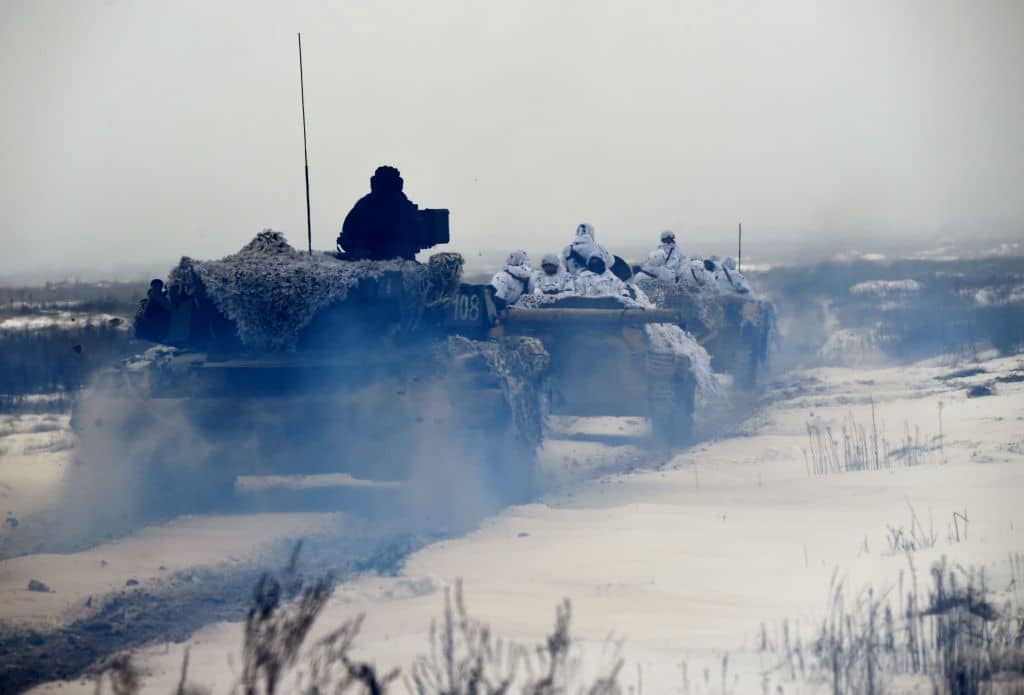So far this week, 128 Russian missiles have been fired at Ukraine. Half were intercepted by air defences, according to figures from Ukrainian authorities, but all too many of the others hit their target: power stations. This is a new phase in war, an anti-humanitarian campaign to cut supplies of water, electricity and leave the notoriously cold Ukrainian winter to do its worst.
‘Ukraine is about to face the hardest winter in all the years of independence,’ said Volodymyr Zelensky in one of his nightly addresses to the nation. About a third of Ukraine’s energy infrastructure has been hit by Russian missiles and Iranian kamikaze drones.
Kyiv had expected Russia to start shelling Ukraine’s critical infrastructure as soon as the first snow fell. But it seems Moscow is having an early rehearsal. The strikes work: dozens of cities, including Lviv, Dnipro and even Kyiv have been left without power or water for hours. Water supply has dried up too: with no electricity at the pumping stations, nothing is produced and household taps have stopped working. Few cities in Ukraine have enough power generators to restore the water supply while repair work is carried out. Ukraine suspects that energy engineers helped the Russian military to plan this missile attack. The biggest damage was made to energy nodes, such as power grid lines and substations.
Ukrainians would rather sit in the cold darkness than negotiate with Vladimir Putin
Only recently, Ukrainians thought they were braced for winter, expecting Russia to turn off the gas. My friends and family have been stocking up: buying thermal underwear, warm duvets, electrical heaters and sleeping bags. I grew up in a detached house with a Soviet-era masonry heater, quite common in Ukraine. That uses firewood, which people are stocking up on. But almost half of Ukrainians live in blocks of flats which rely on central heating: they have no Plan B. Some friends of mine are already making plans to send children to live with relatives in heatable village houses over the winter, as temperatures can get as low as -25ºC. But there’s a military aspect to this: can the army fight the war without gas, electricity or even water?
The Ladyzhynska power plant in the Vinnytsia region was hit by a Iranian kamikaze drone on Tuesday morning. It was repaired by the afternoon but was struck again the same day. The damage is repairable because Russian missiles are so old that they are often quite a bit off target, so it’s seldom a direct hit. This makes a strike-and-repair cycle viable, but it’s unclear if this can last. Those doing the repairing will know that they are sitting ducks for when the next missile comes.
Life in Ukraine is now shaped by the need to preserve energy. Ukrainians have been asked to reduce their electricity consumption – to turn off electric stoves, electric kettles, heaters, washing machines from 5.00 p.m. to 11.00 p.m. Then the national energy company ‘Ukrenergo’ added a request to save electricity in the morning – from 8.00 a.m. to 11.00 a.m. If people across the country don’t limit their energy use, it shuts down. Needless to say, Ukraine no longer has enough electricity to export to the EU.
The elderly are more likely to die when indoor temperatures fall below 19ºC. That’s why the minimum temperature in houses was expected to be 21ºC before the war. A few months ago, this fell to 18ºC – now it’s 16ºC. ‘This is a necessity and our contribution to victory’, said Denys Shmyhal, Ukraine’s Prime Minister. He recommended the purchase of warm clothes, candles, flashlights and batteries. Ukraine is 90 per cent ready for winter, he said. Heating points are being installed across the country. Those who live close to the frontline are being evacuated. The one consolation is that fuel costs won’t be increased for gas, heating, or electricity – Zelensky has signed a moratorium, freezing energy prices till the war ends.
A blitz spirit is spreading in the country: electricity shortage is one more sacrifice for victory. The second biggest Ukrainian postal service ‘Nova Poshta’ launched a campaign, turning off advertising signboards and screens. Other businesses followed, with banks and gas stations switching off the lighting of their offices.
The tactic is logical: Moscow thinks it will force Ukraine to surrender. It will discover that Ukrainians would rather sit in the cold darkness than negotiate with Vladimir Putin. It’s hard to overstate the strength of feeling. We believe in our army, which is using everything it can to down Russian missiles: this video from Monday shows how a Ukrainian soldier takes down a rocket from a Soviet portable anti-aircraft complex ‘Igla’, which has been in service since 1981.
Zelensky’s office is trying to use this new offensive from Russia as leverage, asking the West to send Ukraine more air defence systems. This call was heard even in Germany: the first German IRIS-T air defence system arrived in Ukraine on Wednesday. Britain is sending Amraam rockets, capable of shooting down cruise missiles, and more from other countries are about to come. It’s a new stage in the war, requiring more military defences and human resilience. Ukraine has plenty of the latter: we just need more of the former.
This is taken from this week’s Ukraine in Focus newsletter. Sign up for free here.







Comments